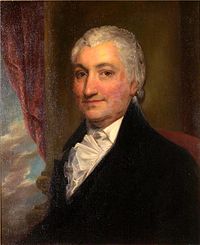 Hugh Henry Brackenridge (1748 – June 25, 1816) was an American writer, lawyer, judge, and justice of the Pennsylvania Supreme Court.
Hugh Henry Brackenridge (1748 – June 25, 1816) was an American writer, lawyer, judge, and justice of the Pennsylvania Supreme Court.A frontier citizen in Pittsburgh, Pennsylvania, USA, he founded both the Pittsburgh Academy, now the University of Pittsburgh, and the Pittsburgh Gazette, still operating today as the Pittsburgh Post-Gazette. Brackenridge was born in Kintyre, Scotland, a village near Campbeltown. In 1753, when he was 5, his family emigrated to York County, Pennsylvania, near the Maryland border, then a frontier. At age 15 he was head of a free school in Maryland. At age 19 he entered the College of New Jersey, now Princeton University, where he joined James Madison and others in forming the American Whig Society to counter the conservative Cliosophic, or Tory, Society. (Today these are conjoined as the American Whig-Cliosophic Society.) After his graduation, Brackenridge remained another year to study divinity. In 1772 he became headmaster of an academy in Somerset County, Maryland. He went back to Princeton for a Master's degree, and then served in George Washington's army as a chaplain, preaching fiery patriotic sermons to the soldiers of the Revolutionary War. He started the United States Magazine in Philadelphia in 1778, where he published poems by his friend Freneau, but its lagging subscriptions convinced him to change his profession. He took a law degree, studying under Samuel Chase in Annapolis, and was admitted to the bar in Philadelphia in 1780 at age 32. Of Philadelphia he wrote, "I saw no chance for being anything in that city, there were such great men before me." Four months later he struck out for the frontier, 300 miles to the west, over the Appalachian Mountains. In 1781 Pittsburgh was a village of 400 inhabitants, most Scots, like himself, Scots-Irish, and Germans. His aim, he wrote, in "offering myself to the place" was "to advance the country and thereby myself." In Pittsburgh he helped establish the first western newspaper, the Pittsburgh Gazette, in 1786. He was elected in 1786 to the Pennsylvania state assembly, where he fought for the adoption of the federal Constitution, and obtained state endowments in 1787 for the establishment of the Pittsburgh Academy (University of Pittsburgh), modeled on Benjamin Franklin's Academy of Philadelphia (University of Pennsylvania). He also played a role in the little known Westsylvania dispute, siding with Pennsylvania that the western lands should not become a 14th state. He lost a bid for re-election because he opposed popular sentiment in supporting federal controls, and he also nearly lost his life when he attempted to mediate the Whiskey Rebellion. The formation of Allegheny County is largely due to Brackenridge's efforts. In December 1799 Governor Thomas McKean appointed him a justice of the Pennsylvania Supreme Court. Brackenridge died June 25, 1816 in Carlisle, Pennsylvania. |



 Home
Home